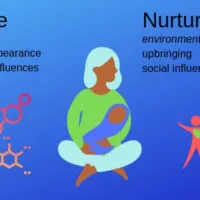A Guide to Developmental Psychology
The story of human development is one of remarkable change and growth from birth through the end of life. While the rapid development of early childhood is the subject of a great deal of attention, it is important to remember that growth and change continue throughout the entire lifespan.
This study guide focuses on important theories, concepts, and terms in the study of developmental psychology. Read each article to learn more about important topics in the field of developmental psychology.
Introduction: What Is Developmental Psychology?
Learn more about developmental psychology, the branch of psychology that focuses on how people change throughout life. It focuses on the physical growth through life and the cognitive, emotional, and social changes that happen in childhood and adulthood.
Nature vs. Nurture
Learn more about the relative contributions of genetics vs. environmental influences on human development.
Early Childhood Development
Learn more about the important events that occur during the early years of a child’s life, including motor, physical, cognitive, and language development.
Major Child Development Theories
Researchers have proposed a number of different theories to explain how human development works. Learn more about seven of the most prominent theories of child development.
Erikson's Stages of Development
Unlike many other theories, Erikson’s psychosocial theory focused on human development throughout every stage of life. Explore Erikson’s eight stages of development to learn more.
Piaget's Theory of Cognitive Development
One of the most prominent theories is Piaget’s theory which explains cognitive development in children. Learn more about how Piaget’s theory works.
Kohlberg's Stages of Moral Development
Kohlberg's theory focuses on the moral development that children experience as they grow. Learn more about how Kohlberg arrived at this theory and the six distinct levels of moral development.
Behavioral Theories of Developmental Psychology
According to the behavioral perspective, all learning and development are driven by associations. Some associations are made unconsciously, while others involve reinforcement and punishment.
Vygotsky's Social Development Theory
Vygotsky was a contemporary of other early developmental theorists, but his work was largely undiscovered until long after his premature death. He emphasized the importance of social and cultural influences on development.
Social Learning Theory: How Bandura's Theory Works
This theory suggests that social influences and processes of observation, modeling, and imitation play an important role in learning and development.
Ecological Theory: Bronfenbrenner's Five Systems
Bronfenfrenner's ecological theory stressed how different systems of influence around a child interact and intersect to influence development.
How Attachment Influences Development
Attachment is an important emotional bond that supports healthy child development. Learn more about how attachment styles form and how they can impact development and healthy attachments.
Attachment Style Quiz: What's Your Attachment Style?
Exploring your own attachment style can be a great way to get a better idea about how attachment influences development and later relationships. Take this quiz to find out what your attachment style might be.
How Parenting Styles Impact Development
How parents interact with their children can also play an important role in child development. Learn more about the four primary parenting styles and how they impact child outcomes.














